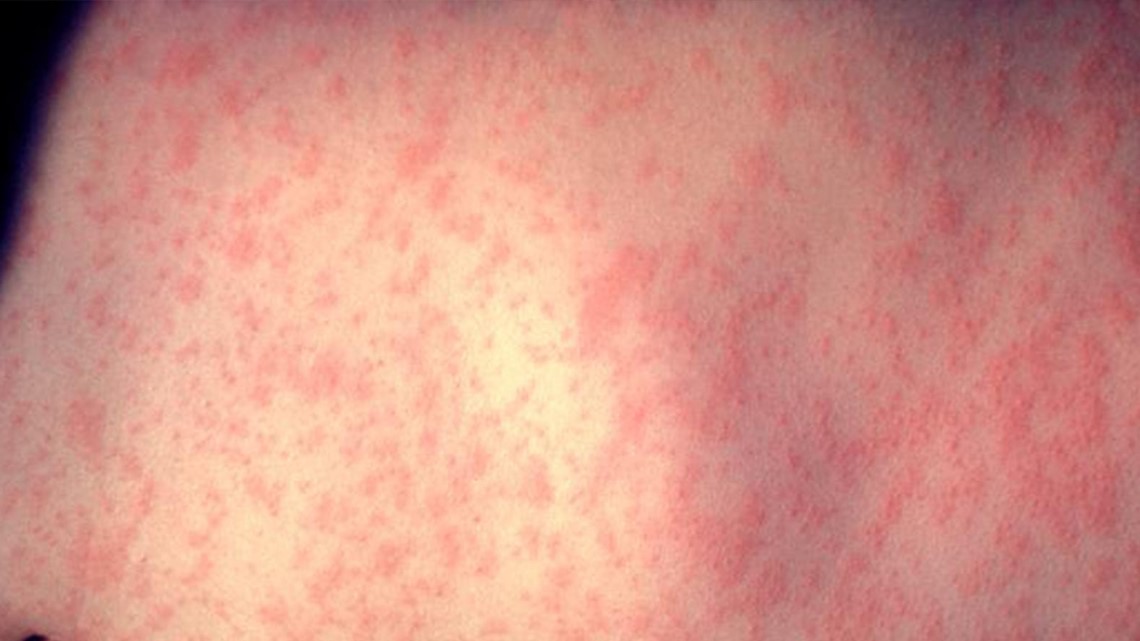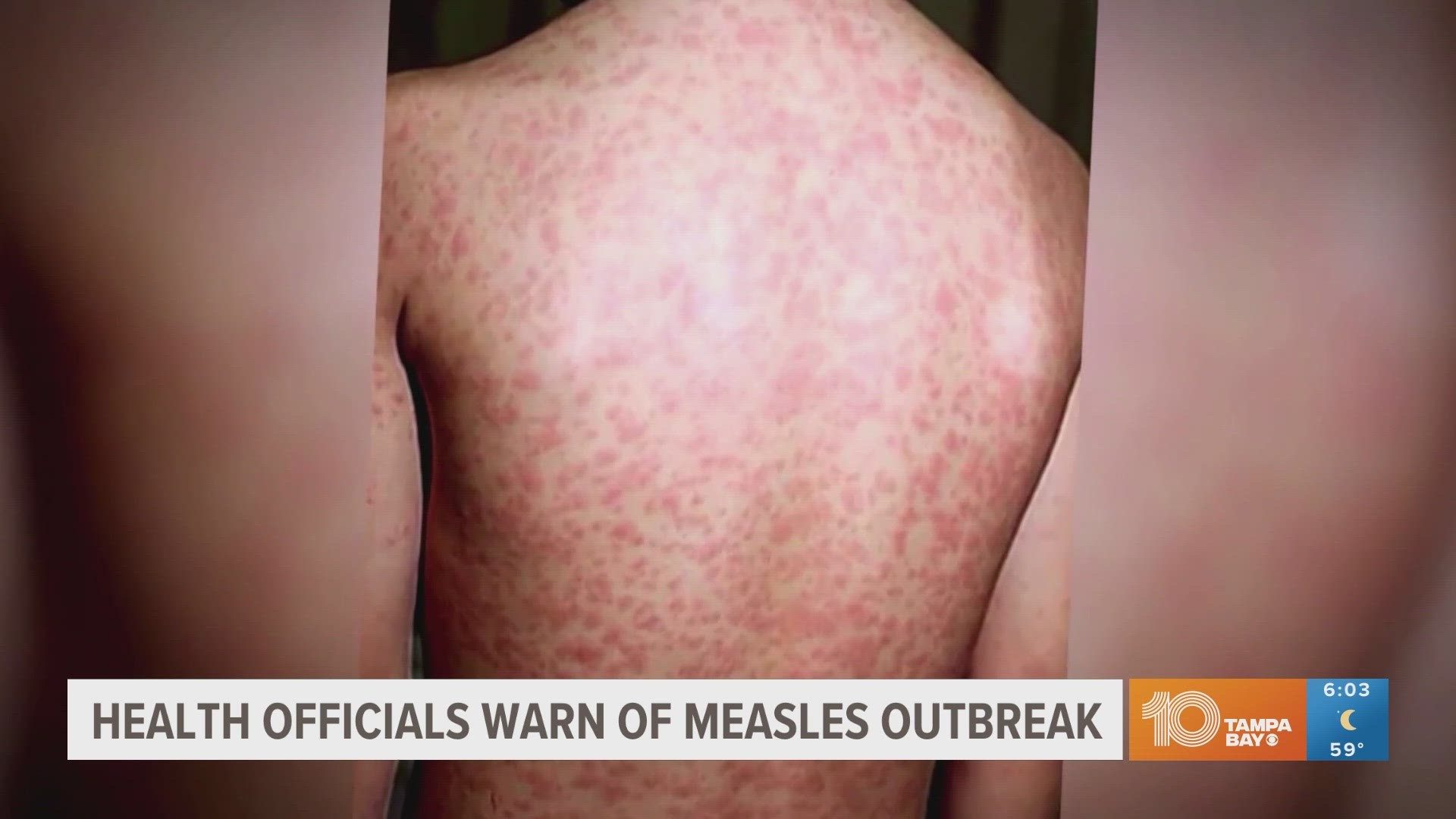ST. PETERSBURG, Fla. — A cluster of measles cases discovered in a Broward County elementary school has doctors, schools and other health departments across Florida on high alert.
According to the Florida Department of Health, four students at Manatee Bay Elementary School were diagnosed with the highly contagious virus. First, one student was reported with a case, believed to be contracted locally, and then the very next day three more cases within the same school were confirmed.
A total of six cases have since been confirmed.
In a letter home to parents, the health department told parents it was working to identify close contacts and also warned of the strong likelihood of spread.
"Up to 90% of individuals without immunity will contract measles if exposed. Because of the high likelihood of infection, it is normally recommended that children stay home until the end of the infectious period, which is currently March 7, 2024." the letter from DOH reads.
In the same letter, however, Florida Surgeon General Joseph Ladapo indicated that there is no requirement for kids to stay home from school, regardless of measles infection or vaccination status.
10 Tampa Bay reached out to each school district within the Tampa Bay area to first check if any measles cases had been found and to inquire about the policies and procedures regarding the disease. Every school district, including Hillsborough and Pinellas, responded by saying they were aware of the measles outbreak, were in communication with their local health departments and also were letting their nurses on campus know.
While parents may be concerned about the virus reaching Tampa and the surrounding communities, Johns Hopkins' Pediatric Infectious Diseases Physician reassures the Measles, Mumps, and Rubella (MMR) immunization is 98 percent effective.
"If measles comes into their area, their child is much less likely to get it," said Dr. Juan Dumois, a Pediatric Infectious Diseases Physician with Johns Hopkins All Children's Hospital. "And if they even get a case, it's going to be a mild case of measles because of that protection offered by the previous vaccine. But it's the children who have not been vaccinated at all, who are at most risk."
According to the Centers for Disease Control and Prevention, 8 percent of Florida's population is not vaccinated for measles. For those who are not protected, the virus can be more serious. Measles has the potential to cause illnesses including pneumonia or encephalitis.
While encephalitis is rare, this swelling of the brain requires hospitalization and intensive treatment. It can cause seizures, hallucinations, permanent brain damage, blindness, hearing loss and memory loss.
Children and adults who are immunocompromised or have underlying health conditions are at the highest risk of developing a severe case of measles. Infants under 12 months old, as well as pregnant women, are also more endangered.
"They are feeling muscle aches and headaches and they're totally miserable. They're not eating, they don't drink a lot. They sometimes end up in the hospital because they're not drinking and they get dehydrated or they can develop pneumonia. And I also know that about one in a thousand children with measles die of it. It kills them," Dumois warned.


Typical symptoms of the measles appear seven to 14 days after coming in contact with the virus and can include:
- High fever up to 105° F
- Red, watery eyes
- Cough
- Runny nose
The most common symptom of measles is a rash that often develops on the face and neck, but can spread to the entire body. Measles rash appears three to five days after the first symptoms.
"And the way they're infecting people is by coughing and talking in the presence of other people because it's then when they speak and cough, those little particles carrying the virus are expelled into the air, and the person nearby who breathes that in can become infected. So in general, like in a household setting, we say that at least 90% of the people in that household are going to catch measles because it's that contagious," Dumois said.
Florida's vaccination rate for measles sits at 92 percent. However, a CBS News investigation, published in November 2023, shows the vaccination exemptions rate for kindergarteners is at a record high. Vaccination exemptions increased to 3 percent of kindergarten students, the most ever reported in the country, and many of those exemptions were not for medical reasons.
To achieve herd immunity though, Yale Medicine says to prevent a measles outbreak 95 percent of the community needs to be achieved.
"In turn, the remaining 5 percent have protection because, at 95 percent coverage, measles will no longer spread," Yale Medicine experts explain.
Florida falls short of the measles immunity threshold by 3 percent of the population not being vaccinated with the MMR vaccine.
If measles symptoms develop, DOH asks people to not visit a healthcare provider without contacting them ahead of time. Instead, contact your local health department to first get instructions on how to safely seek medical attention without exposing others.
Since measles is a virus, the Florida Department of Health explains there is no treatment. Medications can only help alleviate the symptoms. However, depending on when a patient comes down with measles, they could be candidates for post-exposure prophylaxis through MMR or immunoglobulin through their health care provider.

